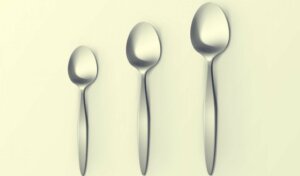Spoon Theory: A Helpful Tool For Those Suffering From Chronic Illness


Written and verified by the psychologist Valeria Sabater
Spoon theory is a metaphor that’s used to describe the amount of mental or physical energy an individual has to carry out their daily activities and tasks. In practice, it’s used to visually represent how much energy someone with a chronic illness may have. In addition, how these people have to plan their days accordingly.
It’s a really interesting approach. Indeed, in reality, all too often, the added burdens that people who suffer from chronic illnesses have to deal with aren’t talked about. For instance, a person suffering from fibromyalgia will experience great difficulties planning their days because they don’t know how much energy they’ll have to go to work, go shopping, take care of their children, etc.
The same is true of the depressed patient or the child with autism. In fact, for those living with a physical or mental health problem, daily chores are often extremely difficult. However, this is an often neglected or misunderstood reality. As a matter of fact, some people even label them as weak or lazy.
Nowadays, people who suffer from chronic illnesses often call themselves ‘spoonies’. Indeed, spoon theory has facilitated the creation of communities of people affected by chronic diseases or mental disorders to support each other or obtain institutional resources.

What does the spoon theory suggest?
The term spoonie is one that many people identify with. In fact, men and women of all ages have formed spoonie communities with the aim of exchanging experiences and obtaining social recognition. It was Christine Miserandino who first postulated the spoon theory in 2003 through an article she wrote on her personal blog But You Don’t Look Sick.
Miserandino developed her theory due to a personal experience when a friend asked her what her life was like living with lupus. To illustrate how she felt, she used spoons to show her friend how much energy she had left for that day. She also demonstrated that, at times, to fulfill daily obligations, she was forced to ‘borrow’ future spoons.
Autoimmune diseases like lupus are characterized by a lack of energy for daily activities. The same is true of any other chronic medical condition and, of course, psychological disorders. Each activity, task, and obligation ‘costs’ a certain number of spoons.
This energy is consumed extremely quickly and to recover (to fill the spoons) the person must rest.
How do you know if you’re a spoonie?
As a rule, you have a good number of ‘energy sources’ within your reach in your daily life. You get up every morning and have little doubt that you’ll be able to fulfill a good part of your daily obligations. You’re able to go to work, class, do housework, etc.
- However, patients with chronic pain, fibromyalgia, lupus, kidney problems, cardiovascular problems, etc aren’t sure that they’ll be able to fulfill all their obligations.
- Also, patients with depression, anxiety, bipolar disorder, or even autism live with the constant uncertainty of not knowing what they’ll be able to do each day.
- Not only do they suffer greater physical exhaustion, but feelings of discouragement, anguish, and stress, etc. also appear.
- On average, they also experience serious problems in sleeping. This makes it difficult for them to regain their energy.
King’s College London, conducted a study. that claimed it’s common for patients with mental disorders to suffer from chronic fatigue or neurasthenia, which further limits them. Spoon theory tries to focus on what’s rarely seen.
It isn’t a weakness. It isn’t a lack of initiative or responsibility. As a matter of fact, spoonies, people with psychological problems or chronic illnesses, simply don’t have the same levels of energy as others.

More awareness is needed
We could give you dozens of examples that justify spoon theory. For example, transgender people often become quickly exhausted living in a body with a gender with which they don’t identify.
Furthermore, many children and adults who are on the autism spectrum are exhausted by certain sound and auditory stimuli that neurotypicals don’t even recognize. In addition, some patients with depression don’t even have the energy to get dressed in the morning. What spoon theory seeks is to become the tool that describes how this group feels. Furthermore, what their lives are like.
The disease that each individual suffers determines the spoons of energy they’ll consume. It could be the case that simply getting out of bed uses them all up. Therefore, they’re left with no more energy for the rest of the day. This is something we should all understand, without any discrimination.
Finally, the guilt associated with suffering a mental or chronic illness is an added burden for these people. Spoon theory seeks that the individual puts that guilt aside. In this way, they’ll be better equipped to understand their own disease. Also, they won’t feel so alone and can find and connect with other spoonies. All they need to do is search for the hashtag #spoonieproblems.
Spoon theory is a metaphor that’s used to describe the amount of mental or physical energy an individual has to carry out their daily activities and tasks. In practice, it’s used to visually represent how much energy someone with a chronic illness may have. In addition, how these people have to plan their days accordingly.
It’s a really interesting approach. Indeed, in reality, all too often, the added burdens that people who suffer from chronic illnesses have to deal with aren’t talked about. For instance, a person suffering from fibromyalgia will experience great difficulties planning their days because they don’t know how much energy they’ll have to go to work, go shopping, take care of their children, etc.
The same is true of the depressed patient or the child with autism. In fact, for those living with a physical or mental health problem, daily chores are often extremely difficult. However, this is an often neglected or misunderstood reality. As a matter of fact, some people even label them as weak or lazy.
Nowadays, people who suffer from chronic illnesses often call themselves ‘spoonies’. Indeed, spoon theory has facilitated the creation of communities of people affected by chronic diseases or mental disorders to support each other or obtain institutional resources.

What does the spoon theory suggest?
The term spoonie is one that many people identify with. In fact, men and women of all ages have formed spoonie communities with the aim of exchanging experiences and obtaining social recognition. It was Christine Miserandino who first postulated the spoon theory in 2003 through an article she wrote on her personal blog But You Don’t Look Sick.
Miserandino developed her theory due to a personal experience when a friend asked her what her life was like living with lupus. To illustrate how she felt, she used spoons to show her friend how much energy she had left for that day. She also demonstrated that, at times, to fulfill daily obligations, she was forced to ‘borrow’ future spoons.
Autoimmune diseases like lupus are characterized by a lack of energy for daily activities. The same is true of any other chronic medical condition and, of course, psychological disorders. Each activity, task, and obligation ‘costs’ a certain number of spoons.
This energy is consumed extremely quickly and to recover (to fill the spoons) the person must rest.
How do you know if you’re a spoonie?
As a rule, you have a good number of ‘energy sources’ within your reach in your daily life. You get up every morning and have little doubt that you’ll be able to fulfill a good part of your daily obligations. You’re able to go to work, class, do housework, etc.
- However, patients with chronic pain, fibromyalgia, lupus, kidney problems, cardiovascular problems, etc aren’t sure that they’ll be able to fulfill all their obligations.
- Also, patients with depression, anxiety, bipolar disorder, or even autism live with the constant uncertainty of not knowing what they’ll be able to do each day.
- Not only do they suffer greater physical exhaustion, but feelings of discouragement, anguish, and stress, etc. also appear.
- On average, they also experience serious problems in sleeping. This makes it difficult for them to regain their energy.
King’s College London, conducted a study. that claimed it’s common for patients with mental disorders to suffer from chronic fatigue or neurasthenia, which further limits them. Spoon theory tries to focus on what’s rarely seen.
It isn’t a weakness. It isn’t a lack of initiative or responsibility. As a matter of fact, spoonies, people with psychological problems or chronic illnesses, simply don’t have the same levels of energy as others.

More awareness is needed
We could give you dozens of examples that justify spoon theory. For example, transgender people often become quickly exhausted living in a body with a gender with which they don’t identify.
Furthermore, many children and adults who are on the autism spectrum are exhausted by certain sound and auditory stimuli that neurotypicals don’t even recognize. In addition, some patients with depression don’t even have the energy to get dressed in the morning. What spoon theory seeks is to become the tool that describes how this group feels. Furthermore, what their lives are like.
The disease that each individual suffers determines the spoons of energy they’ll consume. It could be the case that simply getting out of bed uses them all up. Therefore, they’re left with no more energy for the rest of the day. This is something we should all understand, without any discrimination.
Finally, the guilt associated with suffering a mental or chronic illness is an added burden for these people. Spoon theory seeks that the individual puts that guilt aside. In this way, they’ll be better equipped to understand their own disease. Also, they won’t feel so alone and can find and connect with other spoonies. All they need to do is search for the hashtag #spoonieproblems.
All cited sources were thoroughly reviewed by our team to ensure their quality, reliability, currency, and validity. The bibliography of this article was considered reliable and of academic or scientific accuracy.
- Alhaboby, Zhraa A.; Barnes, James; Evans, Hala; Short, Emma (2017). “Challenges Facing Online Research: Experiences from Research Concerning Cyber-Victimisation of People with Disabilities”Cyberpsychology: Journal of Psychosocial Research on Cyberspace. 11 (1). Art. 8. doi:10.5817/CP2017-1-8
- Conrad, Sarah (2017). “Consider the Spoons: An Embodied Relational Approach to Incorporating Those with Persistent Fatigue into Eco-Activism”. In Nocella, Anthony J.; George, Amber E.; Schatz, J. L. (eds.). The Intersectionality of Critical Animal, Disability, and Environmental Studies: Toward Eco-Ability, Justice, and Liberation. Lanham, Maryland: Lexington Books. pp. 79–97.
- Gonzalez-Polledo, Elena (2016). “Chronic Media Worlds: Social Media and the Problem of Pain Communication on Tumblr”Social Media + Society. 2 (1): 205630511662888. doi:10.1177/2056305116628887
- Harvey, S. B., Wessely, S., Kuh, D., & Hotopf, M. (2009). The relationship between fatigue and psychiatric disorders: evidence for the concept of neurasthenia. Journal of psychosomatic research, 66(5), 445–454. https://doi.org/10.1016/j.jpsychores.2008.12.007
This text is provided for informational purposes only and does not replace consultation with a professional. If in doubt, consult your specialist.







